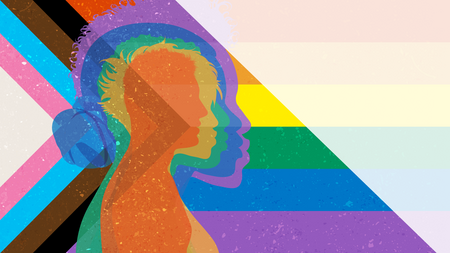If you are in distress, you can call or text 988 at any time. If it is an emergency, call 9-1-1 or go to your local emergency department.
- Reports, Research
Mental Health and Substance Use During COVID-19: Spotlight On 2SLGBTQ+ Communities in Canada
It has been two years since the onset of the COVID-19 pandemic. Since October 2020, the Mental Health Commission of Canada and the Canadian Centre on Substance Use and Addiction have been tracking the relationship between mental health and substance use through a series of bimonthly polls. Concerns about catching the virus, feelings of isolation and hopelessness, financial concerns, job insecurity, the trauma of losing a loved one, or a combination of these and other stressors, have affected us all. However, not everyone has been impacted equally. 2SLGBTQ+ communities have been disproportionately affected by the pandemic due to increases in social, political, and economic inequities. Although several surveys have been conducted to assess the impact of the pandemic on 2SLGBTQ+ communities, there is still a lack of evidence about its effect on mental health and substance use specifically. Key Findings It is important to balance the findings with an understanding that 2SLGBTQ+ communities are strong, hopeful, accepting, and inclusive.
- Reports, Research
Mental Health and Substance Use During COVID-19: Spotlight On 2SLGBTQ+ Communities in Canada
Mental Health and Substance Use During COVID-19: Spotlight On 2SLGBTQ+ Communities in Canada
- 2SLGTBQI+, COVID, Mental Health and Substance Use
It has been two years since the onset of the COVID-19 pandemic. Since October 2020, the Mental Health Commission of Canada and the Canadian Centre on Substance Use and Addiction have been tracking the relationship between mental health and substance use through a series of bimonthly polls. Concerns about catching the virus, feelings of isolation and hopelessness, financial concerns, job insecurity, the trauma of losing a loved one, or a combination of these and other stressors, have affected us all. However, not everyone has been impacted equally. 2SLGBTQ+ communities have been disproportionately affected by the pandemic due to increases in social, political, and economic inequities. Although several surveys have been conducted to assess the impact of the pandemic on 2SLGBTQ+ communities, there is still a lack of evidence about its effect on mental health and substance use specifically. Key Findings It is important to balance the findings with an understanding that 2SLGBTQ+ communities are strong, hopeful, accepting, and inclusive.
SHARE THIS PAGE
RELATED

Review our Assessment Framework for Mental Health Apps — a national framework containing key standards for safe, quality, and effective mental health apps in Canada.

To help expand the use of e-mental health services, we developed four online learning modules based on our Toolkit for E-Mental Health Implementation, in collaboration with the Centre for Addiction and Mental Health (CAMH).

Stepped Care 2.0© (SC2.0) is a transformative model for organizing and delivering evidence-informed mental health and substance use services.

